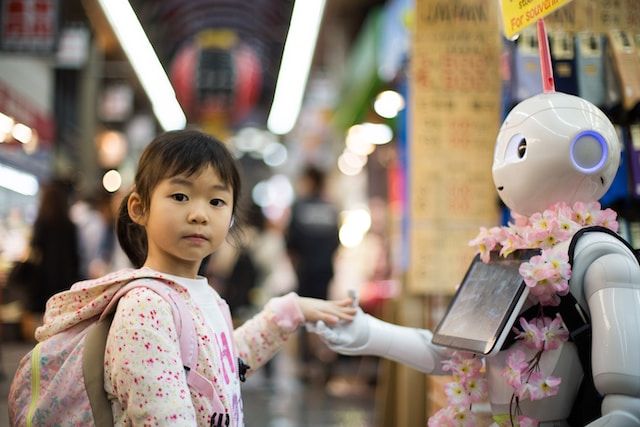Leveraging AI Marketing Tools: The Future of Ecommerce Marketing for Online Stores
- Leveraging AI Marketing Tools: The Future of Ecommerce Marketing for Online Stores
- Introduction
- The Emergence of AI Marketing Tools
- The Unmatched Human Touch in Marketing
- AI Enhancing Decision Making in Marketing
- Recognizing the Limitations and Pitfalls of AI
- AI as a Companion, Not a Replacement
- Embracing AI for a Competitive Edge
- Conclusion
Leveraging AI Marketing Tools: The Future of Ecommerce
Marketing for Online Stores

Introduction
The ecommerce industry is thriving, and with it, the role of marketing is more crucial than ever. For online store owners, staying ahead of the curve is not just a desire but a necessity. However, with the emergence of AI marketing tools, a question looms in the air: Will AI lead to the end of marketing jobs as we know them?
This article, aims to demystify the impact of AI on the future of ecommerce marketing and explain why it's not the harbinger of job extinction but a catalyst for marketing evolution.
As ecommerce marketing takes on a digital-first approach, AI marketing tools are popping up like daisies in spring. This surge in AI technology has sent a ripple of concern through the marketing community, stirring up fears that marketing jobs might soon be on the endangered species list. However, in the dynamic world of online stores, AI is best viewed not as a job thief wearing a silicon mask but as a superhero sidekick, here to amplify the powers of its human counterparts.
AI's knack for crunching numbers and sifting through data at the speed of light is not here to replace the human marketer's innate ability for insight, creativity, and innovation. Instead, it's here to make more room for it. So, for the young, savvy ecommerce store owner, understanding and leveraging AI tools is less about bracing for job loss and more about gearing up for a marketing renaissance.
The Emergence of AI Marketing Tools
The digital marketing landscape is witnessing an unprecedented growth in AI marketing tools, and for a good reason. These tools are revolutionizing the way online stores engage with customers, predict trends, and optimize campaigns. The anxiety surrounding AI's role in the job market is understandable, but it's like fearing the invention of the calculator would end the need for mathematicians. Far from it, AI is automating the more mundane tasks such as data analytics and ad targeting, thus improving efficiency and allowing marketers to focus on the more creative aspects of their jobs.
AI is unlikely to completely replace marketing teams because it lacks one core component: human creativity. This is the lifeblood of marketing—a domain where understanding the emotional and psychological nuances of a customer's journey is paramount. AI can crunch numbers, but it cannot experience that 'aha' moment when an out-of-the-box campaign idea strikes. This is where the young ecommerce marketer's flair for innovation becomes indispensable.
The Unmatched Human Touch in Marketing

Creativity in marketing is like the secret sauce to a gourmet dish—it's what makes a campaign memorable and effective. This is where humans have the upper edge. A machine might analyze data to predict that a humorous meme will engage a certain demographic, but it's the human marketer who can craft the joke that resonates. It's this creativity, coupled with empathy—the ability to walk a mile in the customer's shoes—that AI can assist with but never truly replicate.
Humans excel at telling stories, evoking emotions, and building relationships. These skills are the cornerstones of successful marketing strategies. Whether it's understanding the subtle differences in cultural contexts or crafting a brand narrative that tugs at heartstrings, AI is still sitting in the learner's seat when it comes to these deeply human attributes. So, dear marketers, rest easy—your jobs are as secure as the lock on a teenager's diary.
AI Enhancing Decision Making in Marketing
Data is the currency of the digital marketing realm, and AI is like the Midas touch, turning vast data sets into actionable insights. However, when it comes to making the final call on a campaign or strategy, it's the marketer's judgment that holds the sceptre. AI empowers decision-makers to act quickly and with a better understanding of the data at hand, but it is the marketer who reads between the lines and sees the full picture.
In an ecommerce setting, where decisions need to be made at lightning speed, AI's ability to analyze customer behaviour, predict trends, and optimize pricing is invaluable. Yet, it's the marketer who synthesizes this information with an understanding of human psychology, market conditions, and brand identity. It's a dance of binary and brainpower, with AI providing the rhythm and humans moving to the beat.
Recognizing the Limitations and Pitfalls of AI
AI is only as good as the data it's fed. If the data is the equivalent of a fast-food diet—full of empty calories and questionable choices—then the results will be similarly unhealthy. Corrupt, incomplete, or biased data can skew AI's outputs, leading to decisions that are off the mark. This is why human oversight is crucial. Think of it like a parent double-checking their teenager's homework; it's not that you don't trust them, but a second look never hurts.
Despite the fear-mongering headlines, AI isn't so much taking jobs as it is shifting them. Just as the invention of the automobile created a need for drivers, mechanics, and traffic cops, AI is creating roles for data scientists, AI trainers, and ethical compliance officers. The job market is evolving, and so must the skill sets of marketers.
AI as a Companion, Not a Replacement

AI in marketing is less like a robotic overlord and more like a trusty sidekick. It offers a helping hand by taking on repetitive tasks, providing insights at scale, and personalizing customer experiences. But at the end of the day, it's the human marketers who steer the ship. They are the ones who interpret AI's data-driven suggestions and turn them into campaigns that tell a story and elicit emotions.
For instance, AI marketing tools can segment audiences and predict purchasing behavior, but it's the marketer who crafts the messages that resonate with each segment. The most successful online stores don't just use AI; they use it strategically, with a human touch guiding its application. It's a dynamic duo where both parties have their strengths, and together, they're unstoppable.
Embracing AI for a Competitive Edge
In the cutthroat world of ecommerce, those who adapt, thrive. Embracing AI is no longer optional; it's a competitive necessity. However, wielding this powerful tool comes with responsibility. Ethical use of AI in marketing is paramount, and it's the human marketer's job to ensure that the AI is not only smart but also morally sound.
Continuous learning is the name of the game. Keeping abreast of the latest AI advancements and understanding their applications in marketing can turn a good campaign into a great one. It's about harnessing the power of AI to inform, not dictate, marketing strategies. So, to the young ecommerce entrepreneurs, dive into the world of AI with curiosity and creativity. Learn its language, play to its strengths, and let it amplify your marketing prowess.
Conclusion

AI is not the end of the marketing road; it's a new beginning. It's a transformative tool that, when used intelligently and ethically, can elevate ecommerce marketing to new heights. Online store owners, particularly the young and ambitious, can look forward to a future where AI and human ingenuity combine to create marketing magic. So, embrace AI, learn from it, and let it turbocharge your marketing efforts. After all, in the world of ecommerce, the only constant is change, and AI is the latest passenger on this exhilarating ride.
In conclusion, AI in marketing is not a job killer; it's a job transformer. It's a powerful ally that can help marketers do their jobs better, faster, and with greater impact. The future of marketing jobs is not in jeopardy; it's just evolving. And for those who are willing to learn and adapt, the possibilities are endless.